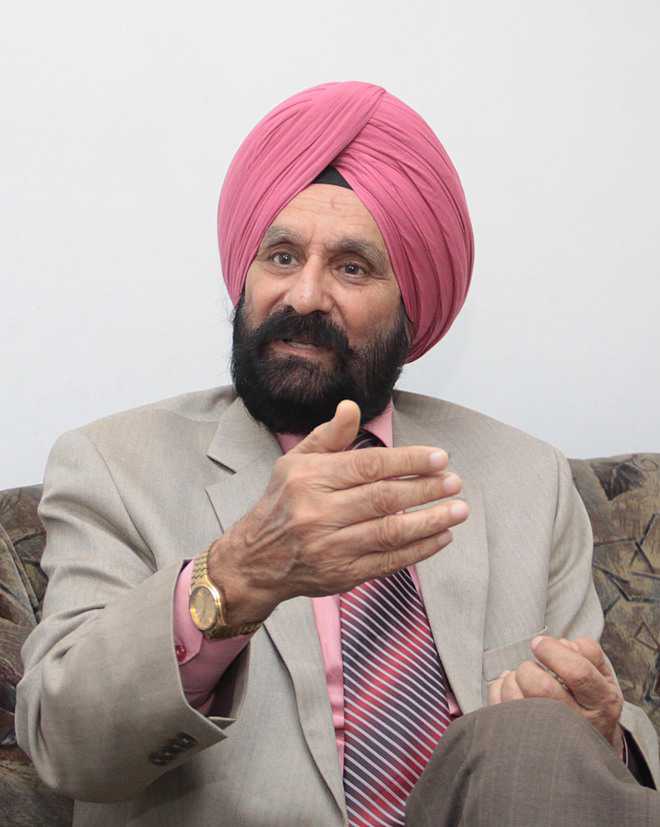One of the highly acclaimed Punjabi authors Waryam Singh Sandhu needs no introduction in the literary circles across the country. His work of fictional short stories in Punjabi has been translated into numerous Indian languages, including Hindi, Bengali and Urdu and English. Born at Sursingh village in Amritsar district, Sandhu migrated to Jalandhar in late 1980s as he was getting threatening calls during the militancy period in Punjab, where he served as a professor at Lyallpur Khalsa College.
His short story book “Chauthi Koot” not only got him Sahitya Akademi Award in 2000, a Punjabi film was based on two stories from the same book that got a standing ovation at International Cannes Film Festival in France earlier this year.
In an interview with The Tribune correspondent Gagandeep Singh, Waryam Singh Sandhu unties various knots of his literary life.
“Chauthi Koot”, a Punjabi film based on two of your short stories “Chauthi Koot” and “Hun Main Thik Thak Han”, has won accolades at Cannes apart from grabbing several national and international awards. What is your reaction to the way the film was made?
I have not got a chance to watch the film as yet, though film director Gurvinder Singh insisted on my accompanying him to the Cannes International Film festival. I was busy in something else at that time. However, I have heard that it got a very good response.
What is “Chauthi Koot” all about?
The short story book was published in 1998. It was very close to the reality of what happened in Punjab during the militancy period though it was fictionalised. Some of the characters in the book are real. The stories are basically about how common persons are being victimised by both rebels who fight against the establishment and the police and paramilitary forces.
You have witnessed political chaos very closely like Naxalite movement, Emergency, militancy period in Punjab and the present scenario. References of these incidents are also depicted in your writings. Are you writing about what is happening now?
Religious fanaticism has been at an all-time high. Forces are up in arms to saffronise the country and the aura of secularism has been at stake. I have not written anything on these issues so far, yet I am being invited to deliver lectures in villages, colleges, universities and at international forums, where I have spoken against these issues vehemently, though the medium is different this time.
There have been two armed struggles in the Punjab to bring about political or regime change. Do you think political change is possible with armed struggle?
I have witnessed two armed struggles, including the one of Naxalites and Sikh militancy. None of them could succeed. What I have concluded is that armed struggles cannot bring about any political change, particularly in this part of the world.
There has been a practice among literary personalities to return their awards following the murder of rationalist writer MM Kalburgi and the lynching of a Muslim man in Dadri. What is your reaction to the same?
I was third one among the writers in the country who returned awards. Yet our awards have not been taken by the Sahitya Akademi. Even the cheques have not been cashed so far. In a letter written to me after returning the awards, the Sahitya Akademi said they respected our feelings, yet they had no provision to accept our awards back. So technically awards are still with the awardees. Since the Sahitya Akademi is a non-political body, therefore I personally feel that returning awards is not a rational thing to do.
During the Emergency, it was predominantly the intellectual flock that was targeted by the establishment. Did you face anything of this sort?
It was the peak time of my writing career. Since most of the writings, including stories and poems, were anti-establishment, it was inevitable for the authorities to take notice of these. I was detained by the police, when my daughter was around five months old. The police arrested me for my writings “Lohe De Hath” that was termed anti-establishment.
When did you start thinking that you had the knack of story writing and you should work in this field to groom yourself?
I started from poetry. I was in class VIII when I recited my own poetry on stage in a competition. I got tremendous response from teachers and school mates, which was an encouragement for me. Then I started writing for newspapers and weekly magazines. I also started writing short stories, when I grew up. When I started comparing myself with contemporary poets like Avtar Singh Paash, I realised that I could excel in short story writing and started putting in more energy in writing stories.
Apart from stories, what else you have written?
I have written a novel “Poh Futala” published in a literary magazine and travelogues. I have also written a book about Gadharis and the Gadhar movement.
Unlock Exclusive Insights with The Tribune Premium
Take your experience further with Premium access.
Thought-provoking Opinions, Expert Analysis, In-depth Insights and other Member Only Benefits
Already a Member? Sign In Now










